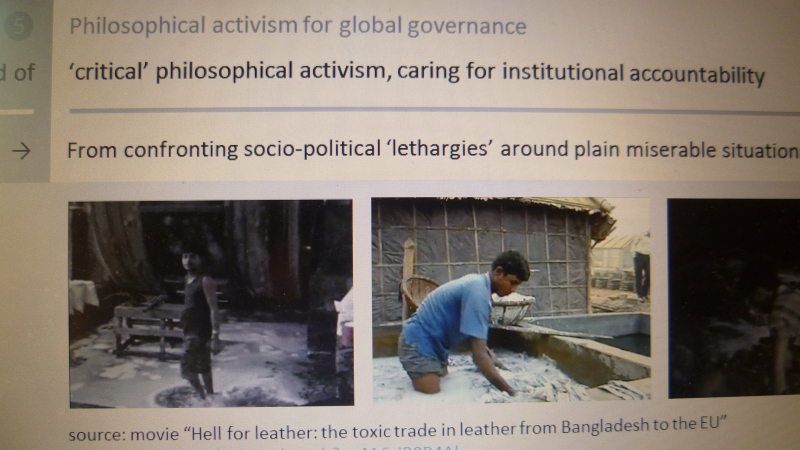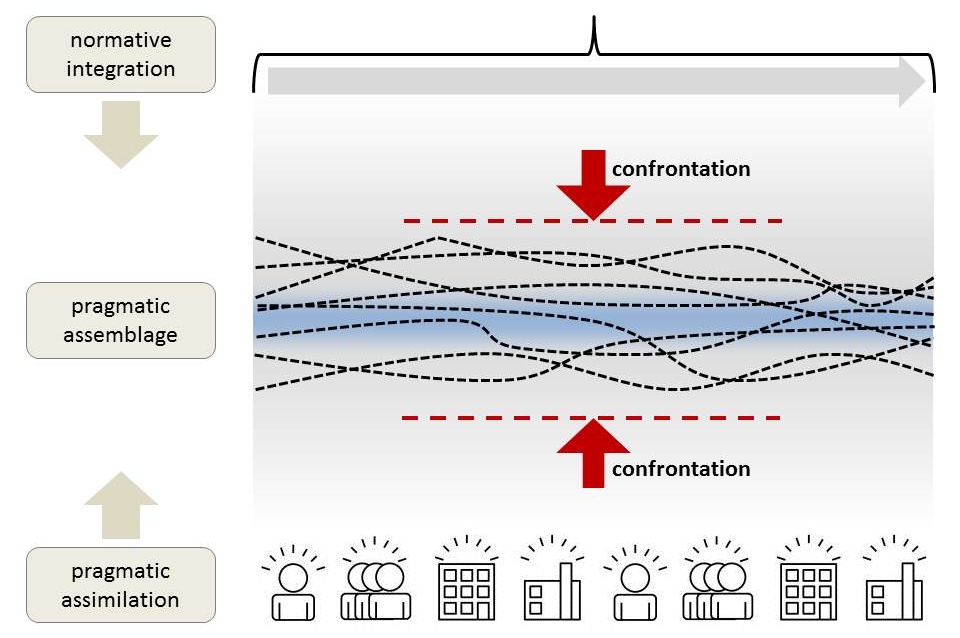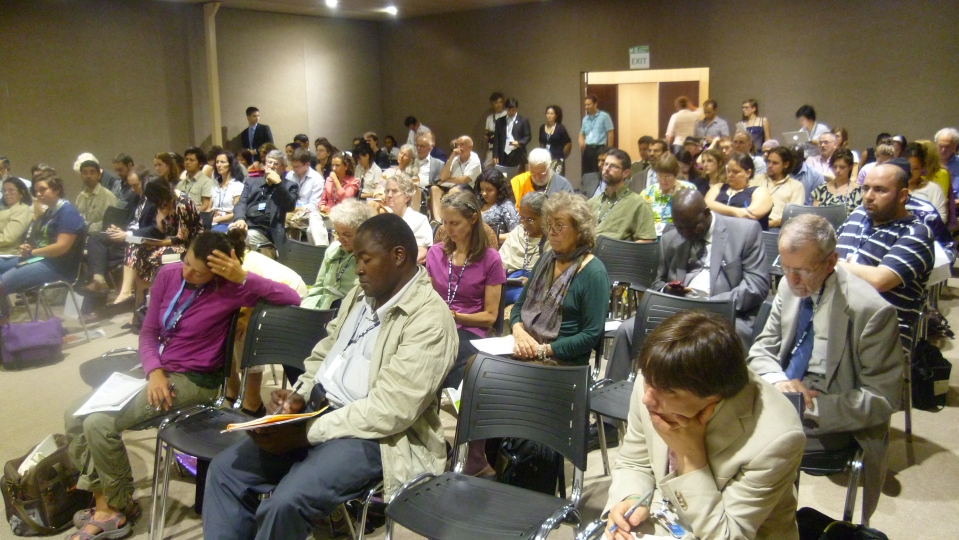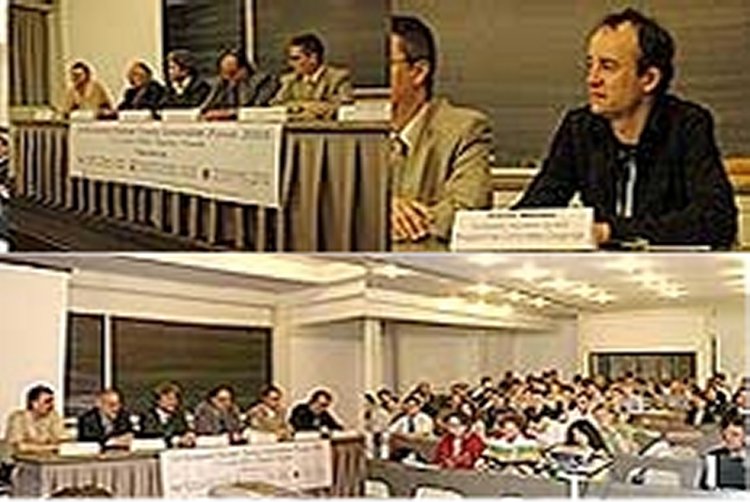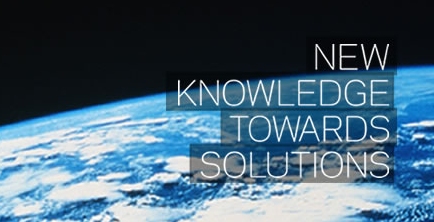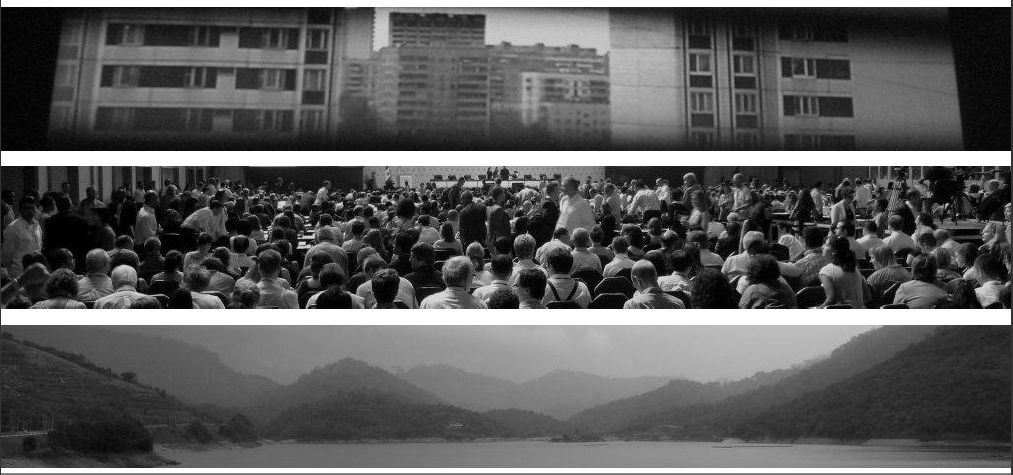The philosophical activism tour of The PhɅAct Collective can now be consulted at Norms and Dialectics, the online journal of the collective. The list will be updated on a continuous basis. Also the interventions done before 2006 will be added for archive purposes. See the list as of today also below.
upcoming (more to add soon)
Rome, 19 September 2012
Organising a workshop on the critical assessment of scientific foresight methods at the the Italian National Agency for New Technologies, Energy and Sustainable Economic Development
Berlin, 5 October 2012
Lecture ‘A politics of confrontation for sustainable development governance’ at the 2012 Berlin Conference on the Human Dimensions of Global Environmental Change
Buenos Aires, 24 – 26 April 2013
Invited Lecture ‘The Trouble with Justification’
previous
Charlotte (US), 5 – 10 August 2012
Interactive Workshop on the Ethics of Technological Risk Governance
Rio de Janeiro, 11 – 23 June 2012
Organising a workshop on a human rights based approach to sustainable development and working on the Equity Treaty at the United Nations World Summit on Sustainable Development.
London, 25 – 29 March 2012
Presenting the “The Possibility of global Governance” Project at the Conference “Planet Under Pressure”
New York, 18 – 24 March 2012
United Nations Rio+20 Summit Intersessionals at the UN HQ
Madrid, 5 – 6 March 2012
The Ethics of Technological Risk Governance – Meeting on Transdisciplinarity in Education and Training
Brussels, 21 – 22 February 2012
Organised workshop “Exploring the Science, Politics and Ethics of Nuclear Technology Assessment”
Warsaw, 12 – 16 February 2012
Presentation “Public Reflexivity and its discomforts” at the ENS PIME Conference
Munich, 24 – 25 January 2012
Preparing an Energy Modelling Assessment workshop for the European Fusion Development Agreement Socio-Economic Research on Fusion programme
New York, 15 – 20 January 2012
United Nations Rio+20 Summit Intersessionals at the UN HQ
Madrid, 10 – 13 January 2012
The Ethics of Technological Risk Governance – Meeting on Transdisciplinarity in Education and Training
Cape Town & Durban, 28 November – 11 December 2011
United Nations Climate Change Conference
New York, 13 – 18 December 2011
United Nations Rio+20 Summit Intersessionals at the UN HQ
Geneva, 10 – 11 October 2011
United Nations Research Institute for Social Development conference
Bonn, 3 – 5 September 2011
64th Annual United Nations DPI/NGO Conference “Sustainable Societies; Responsive Citizens”
Kuala Lumpur, 9-10 May 2011
Invited lecture “The Ethics of Radiological Risk Governance”, International Course for Inspectors organised by the International Atomic Energy Agency
Brussels, 27 April 2011
Invited expert to the Meeting of the Working Group on the Ethics of Nanotechnologies of the UNESCO World Commission on the Ethics of Scientific Knowledge and Technology (programme & participants)
Brussels, 11 April 2011
The Trouble with Justification’, invited lecture in the ‘Aarhus Convention and Nuclear Energy’ symposium organised by the University of Brusels and SCK-CEN
Cyprus, 28 – 30 March 2011
Coordination of Reflection Group on “Establishing a transdisciplinary knowledge base for nuclear safety and radiological protection”
Karlsruhe, 28 March 2011
Invited lecture “The Ethics of Radiological Risk Governance”, Karslruhe Institute of Technology
Karlsruhe, 21 March 2011
Invited lecture “The Ethics of Radiological Risk Governance”, Karslruhe Institute of Technology
Lisbon, 14 – 16 March 2011
Invited lecture “The Ethics of Radiological Risk Governance”, ITN – Institute for Nuclear Technology, Lisbon
New York, 6 – 8 March 2011
United Nations Commission on Sustainable Development Preparatory committee for the World Summit on Sustainable Development.
Cancun, 29 November – 10 December 2010
United Nations Climate Change Conference, COP16 & Kyoto Protocol COP/MOP 6
Lisbon, 10 – 12 Nov 2010
Lecture “The Last Paradigm? Deliberate Visions on a Sustainable World” at the International Conference “Intellectual Topographies and the Making of Citizenship”, University of Lisbon
Ghent, 18 – 19 Oct 2010
Research interactions at the International Conference on “Moral Responsibility – Analytic Approaches, Substantive Accounts and Case Studies”, Centre for Ethics and Value Inquiry, University of Ghent, Belgium
New York, 20-24 Sept 2010
Study visit
Paris, 15 September 2010
10Y Anniversary Colloquium of the Forum on Stakeholder Confidence in Radioactive Waste Governance
New Haven, 17-19 Sept 2010
Lecture “Governance Through Better Relativism – Seven Challenges to a Future Climate Change Debate” and research interactions at the 2nd Yale-UNITAR International Conference on Environmental Governance and Democracy, Yale University
Vienna, 22 – 24 June 2010
Invited contribution to the Technical Committee Meeting on Public Perception of Fast Reactor Technology, International Atomic Energy Agency
Barcelona, 28 May 2010
Start-up meeting of the Integrated Sustainability Assessment of Energy Governance project
Princeton, 08 May 2010
Debating the Nuclear Weapons Convention – Observing and reporting on the preparation of a negotiations simulation exercise by 20 international students
New York, 01 – 10 May 2010
United Nations Review Conference on the Non-Proliferation Treaty
New York, 01 – 10 May 2010
United Nations Commission on Sustainable Development 18th session
Luxemburg, 08 April 2010
Contribution ‘Research analysis of the Belgian radioactive waste governance approach’ to the EC European roundtable on the Implementation of the Aarhus Convention
Palermo, 09 March 2010
Invited lecture ‘Beyond the search for truth – analysing what complicates the societal justification of nuclear technology’ for the EC ICARO Course [pdf]
Brussels, 19 March 2010
Invited lecture ‘The Ethics of Energy Governance’ for the EU-40 Group
Ghent, 5 March 2010
Lecture ‘The Possibility of Global Governance’ at the Ghent University Faculty of Arts and Philosophy [pdf]
Brussels, 23 February 2010
Research interaction at the EFONET Workshop
Brussels, 30 January 2010
Invited statement on the ethics of participatory decision making in the context of radioactive waste governance at the Public Forum organised by the King Baudouin Foundation
Copenhagen, 7 – 18 December 2009
United Nations Climate Change Conference, COP15 & Kyoto Protocol COP/MOP 5
Garching, 26 November 2009,
Max Planck Institute Meeting on the future research needs in the frame of the Socio-economic Research on Fusion (SERF) programme of the European Fusion Development Agreement of the EC
Lisbon, 8 – 11 November 2009
Invited lecture on “Lecturing ethics in courses on radiological protection and nuclear technology assessment: feedback on 5y of academic experience”
Sevilla, 27 – 30 October 2009
Invited lecture on “Transparency and Public Acceptance – a critical analysis of the complexity of nuclear technology assessment”, Annual conference of the Spanish Nuclear Society
Cumbria, 19-21 October 2009
CARL Workshop on the future research in social sciences and humanities on societal aspects of radioactive waste governance
Paris, 7 – 8 October 2009
Research contribution on the “European Guidelines for Inclusive Radioactive Waste Governance” in the frame of the Cowam in Practice project
Helsinki, 23 – 25 August 2009
Research contribution “Theoretical Perspectives on Participation and Democracy” to the ARGONA project
Paris, 6 – 7 July 2009
Research interactions at the CIPAST conference “Governing Uncertainty: The Contribution of Social Sciences to the Governance of Risks in Environmental Health”
Bucharest & Constanta, 17 – 19 June 2009
Lecture on ‘The Ethics of Inclusion and Compensation’ in the frame of the Radioactive Waste Governance research programme
Stockholm, 5 – 11 June 2009,
VALDOR Conference Lecture ‘Happenings at the science-policy interface – The case of radioactive waste governance’ (pdf)
Cordoba, 19 – 25 May 2009,
EYGN Forum Invited lecture on ‘Aspects of Participation and Transparency in Nuclear Technology Assessment’ (in the frame of the project ‘A Philosophy of Justification – the case of technology assessment’ (pdf)
Bergen, Norway, 10 – 12 May 2009,
World Social Science Forum presentation of the research outline of the project ‘The Possibility of Global Governance’
Paris, 23 – 25 March 2009
International Chambre of Commerce Headquarters Research interactions at the ICC Energy and Environment Commission
Uppsala, 16 – 19 March 2009
research interactions and input on the future European research policy on Risk Governance
Lisbon, 8 – 14 March 2009
Erasmus IP ICARO Course, University of Lisbon, ITN Lecture ‘Ethics and the Principle of Justification – the case of Nuclear Technology Assessment’
Manchester & St Bees, 9 – 13 February 2009
Research interactions on policy approaches in the frame of Inclusive Governance of Radioactive Waste
Berlin, 22 – 25 January 2009
Research and writing travel
Stockholm, 13 – 14 January 2009
Update research ‘Theoretical Perspectives on Participation and Democracy’, ARGONA project
Paris, 8 – 9 January 2009
Research interactions on the future European research policy on Risk Governance
Poznan, 01 – 12 December 2008
Research work at the 13th Conference of the Parties, United Nations Framework Convention on Climate Change
Paris, 24 October 2008
Discussion meeting on the Aarhus Convention in the context of governance of radioactive waste
Barcelona, 16 – 17 September 2008
Lecture on ‘Democratising the Science-Policy Interface’, EC FP6 OBRA Final Conference
Bucharest, 10 – 11 September 2008
Intervention on Aspects of Democracy in Inclusive Governance of Radioactive Waste – the Romanian context
Prague, 3 – 5 September 2008
Lecture – status update on the ‘Theoretical Perspectives of Participation and Democracy’ project
London, 26 – 27 June 2008
Intervention in the ENS Board meeting on research culture in nuclear technology assessment
Paris, 18 June 2008
Discussion on policy approaches in the frame of Inclusive Governance of Radioactive Waste
Prague, 13 – 14 June 2008
Lecture – status update on the ‘Theoretical Perspectives of Participation and Democracy’ project
Paris, 10 June 2008
Intervention on Aspects of Democracy in Inclusive Governance of Radioactive Waste – the French context
Porto, 24 May – 1 June 2008
Research and writing travel
New York, 09 – 17 May 2008
UN Headquarters Research work, CSD15, United Nations Commission on Sustainable Development
Budapest, 04 – 07 May 2008
NESTet Conference Lecture ‘Transdisciplinary Aspects of Education and Training in Radiological Risk Governance’
Bucharest, 14 – 16 April 2008
Intervention on Aspects of Democracy in Inclusive Governance – reflections on risk compensation
Nusa Dua, Bali, 3-14 December 2007
Research work and invited lectures on the use of knowledge in global decision making on complex problems, 13th Conference of the parties, United Nations Framework Convention on Climate Change
Paris, 23 May 2007
Conference ‘Intellectual capital for communities in the knowledge economy’
New York, 1-11 May 2007
United Nations Headquarters Research work, CSD15, United Nations Commission on Sustainable Development
Stockholm, 25 April 2007
Discussion meeting on research work ‘Theoretical perspectives on participation and democracy’
Lisbon, 23 March 2007
University of Lisbon Invited lecture on ‘Risk, transpareny and free choice – On the complexity of risk inherent technology assessment’
Prague, 7 February 2007
Technical University of Prague Invited lecture on ‘Ethical aspects of risk inherent technology applications’
Rauma (Finland), 2 February 2007
Vuojoki Castle Workshop and debates on deliberative democracy and stakeholder involvement
Amsterdam, 8 December 2006
Centrum De Brakke Grond Public statement on the clash between art and science on the occasion of the theatre piece ‘De utopie van het atoom’, in cooperation with Cie De Koe
Stockholm, 22-23 November 2006
Start research group on ‘Theoretical perspectives on participation and democracy’, ARGONA Project
Nairobi, 8-17 November 2006
Research work, COP12 Conference, United Nations Framework Convention on Climate Change
Ghent, 28-29 September 2006
Conference ‘Social Sciences and Democracy’
Prague, 13 September 2006
Invited talk on ‘A transdisciplinary approach to education and training’, 10th EAN Workshop
Stockholm, 21 June 2006
Workshop moderator ‘The Politics of Sustainable Development’
Brussels, 18 May 2006
Public talk on ‘The Art of Knowledge’, together with the author Kader Abdollah, Homo Universalis series, Vlaams-Nederlands Huis De Buren
Stockholm, 15-18 May 2006
Public statement on ‘The philosophy of risk and injustice’, VALDOR Conference
New York, 8 May 2006,
NY University, Dept Political Philosophy Workshop ‘Another state is possible’
New York, 2-12 May 2006
United Nations Headquarters Research work, CSD13, United Nations Commission on Sustainable Development
Ghent, 27-29 April 2006
Ghent University Conference on Global Ethics in Political Philosophy

